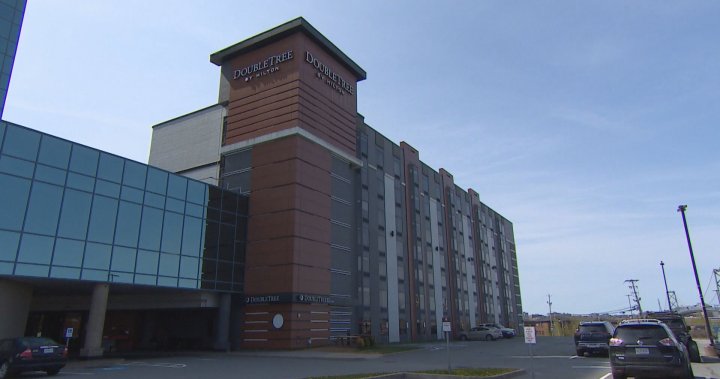The Dartmouth, N.S. hotel-turned-homeless shelter known as ‘The Bridge’ has been operating for several months now — the largest facility of its kind in the province.
However, a staffing shortage on the designated health floor means some rooms remain empty.
“There is seven (clients) right now that live on the health floor, and what is a challenge right now is just finalizing the compliment of the staffing,” explained Nova Scotia Health (NSH) Community Transitions director Wendy McVeigh.
According to NSH, there is currently one client support worker (CSW) on the health floor working alongside continuing care assistants (CCA).
Five CSW’s are required to fill the 24/7 schedule for the floor to operate fully — meaning 21 out of the 28 rooms on the floor are currently unoccupied.
“Empty rooms going and people are freezing, I don’t understand this,” said Richard Young.
He’s been living in a tent at Grand Parade in front of City Hall and lives rough on the daily.
The thought of empty rooms that could otherwise provide shelter doesn’t make sense to Young.
“It was minus four the other night, some people didn’t have sleeping bags,” Young recalled “We don’t have heaters, we have summer tents, so it’s just like putting a thin sheet over you — you’re freezing.”
While space may exist on the health floor, Nova Scotia’s Department of Community Services (DCS) says The Bridge is typically at 95-100 per cent capacity.
There are 152 rooms available for clients, not including the health floor, but the numbers of clients served may be higher as some people share rooms with partners or siblings.
Even though NSH are working on the staffing shortage to get CSW’s on its floor, medical staff at The Bridge have been kept busy — serving the entire building rather than just the designated floor.
“The early stage of this was, ‘we needed a health floor,’ but as we’re evolving it’s not a health floor because the health services go wherever the person is,” said McVeigh.
She says it’s about wraparound coordination of services for clients: health, housing and social supports.
“We have health services throughout the building now, we have the health clinic operational seven days a week on site,” said DCS spokesperson Joy Knight.
“I think it’s already showing evidence that having that integration of health and homelessness services together makes a really positive impact on people.”
Upwards of 200 people that have lived in The Bridge have used the facility’s health clinic since it opened, averaging 80 visits per week.
“If there’s a health change in a person’s health, help is there providing a resource and support,” said McVeigh. “The last stage of this is to open those remaining 21 rooms on the health floor.”
Nova Scotia Health says a plan is in place to start ramping up staff on the health floor by next month, but that some rooms will remain unoccupied in case hospital patients need to be transferred.
McVeigh says that, on any given day, there are multiple homeless community members that NSH identifies as people that would benefit from intake on the health floor at The Bridge — if staffing allowed for it.
© 2023 Global News, a division of Corus Entertainment Inc.



